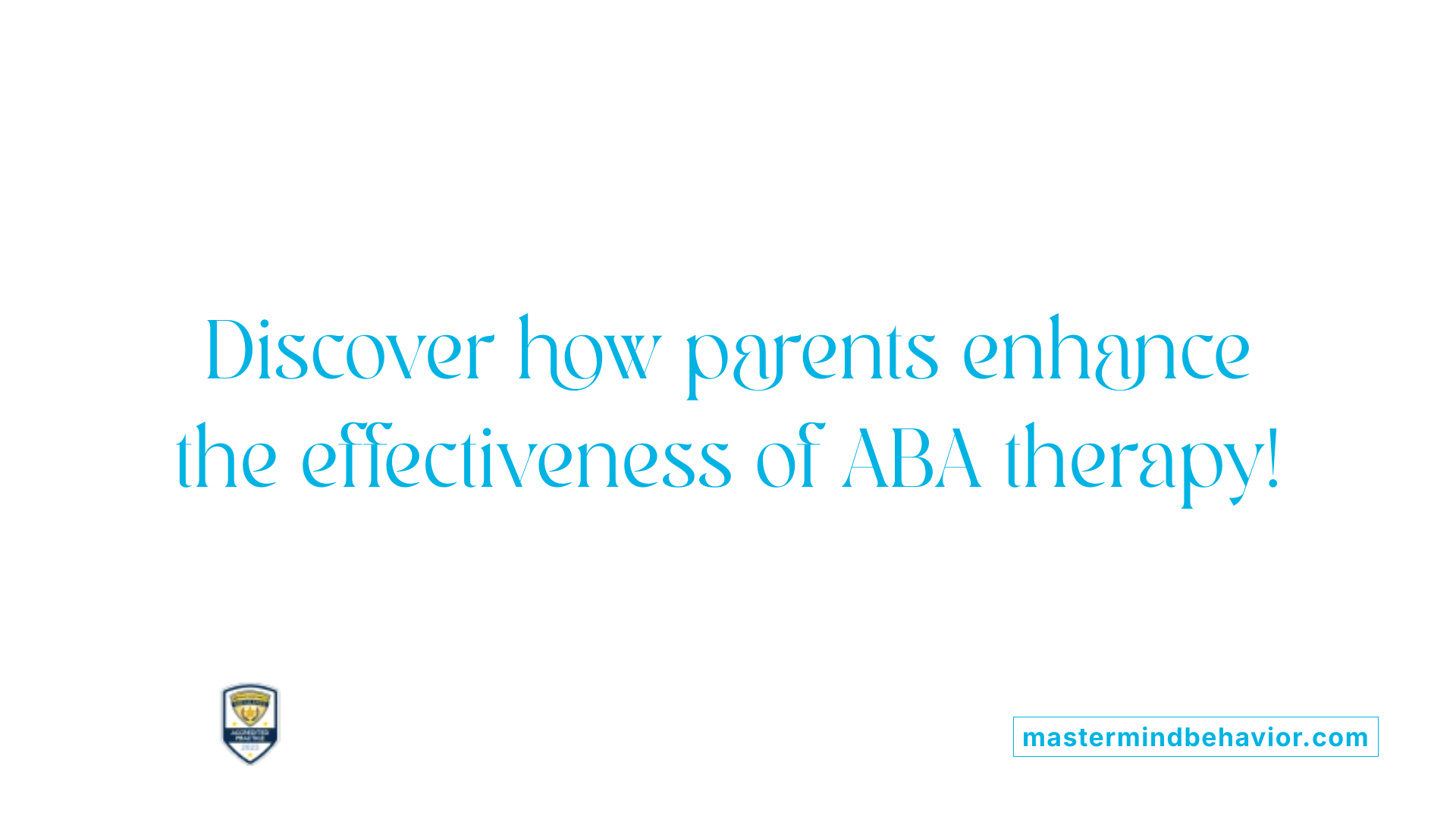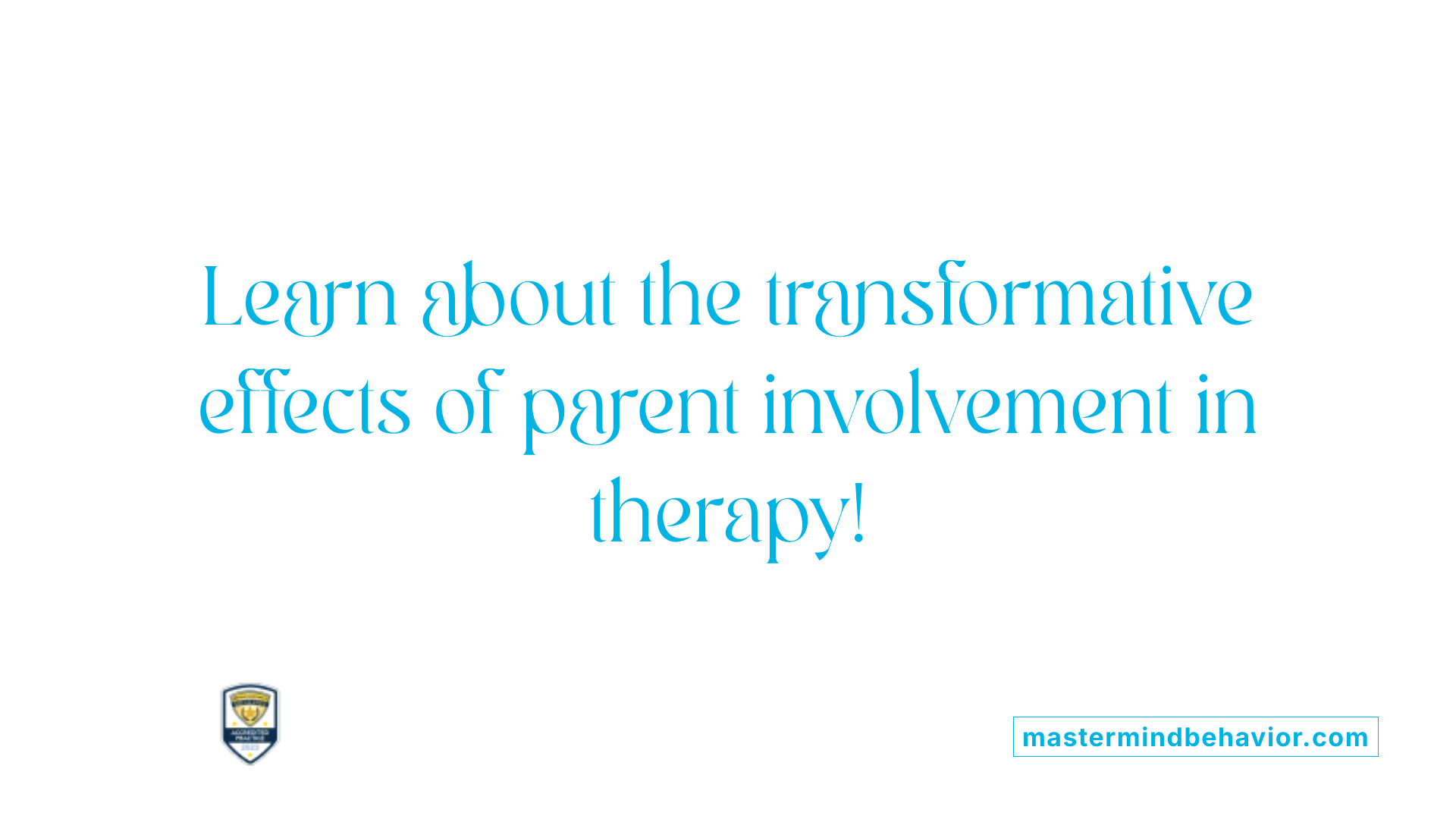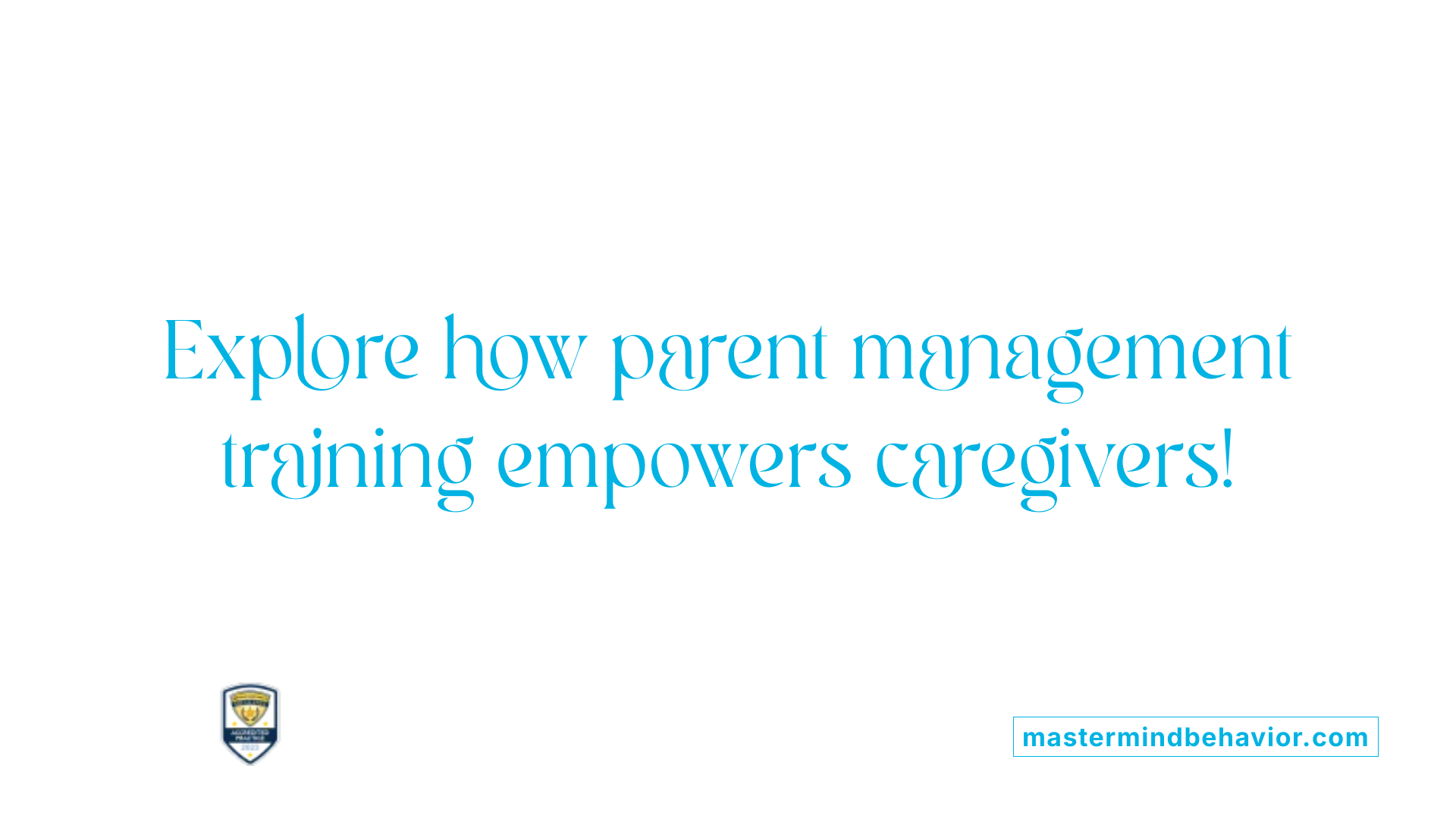The Role of Parent Training in Autism Behavioral Therapy

Introduction
Parent training is a cornerstone of autism therapy, particularly within the framework of Applied Behavior Analysis (ABA). As parents strive to support their children diagnosed with Autism Spectrum Disorder (ASD), understanding their role and how it can impact treatment outcomes becomes crucial. This article explores the importance, benefits, and methods of parent training in enhancing autism behavioral therapy.
Understanding the Vital Role of Parents in ABA Therapy

What role do parents play in ABA therapy?
The role of parents in Applied Behavior Analysis (ABA) therapy is essential for their child's success. They significantly contribute by reinforcing therapy techniques at home, which ensures that skills learned in a clinical setting are carried over into daily life. This consistency across different environments is crucial for solidifying behavioral changes in children with Autism Spectrum Disorder (ASD).
Parents are often trained to implement specific strategies used by therapists. This hands-on training empowers them to apply techniques such as positive reinforcement, behavior management, and crisis navigation, enhancing their child's learning process beyond formal therapy sessions. When parents understand their child's Behavior Intervention Plan (BIP), they can manage and mitigate challenging behaviors more effectively in real-life situations.
Additionally, the insights parents offer about their child's behavior and progress are invaluable. Such involvement allows therapists to tailor interventions more closely to the child's unique needs, increasing the overall effectiveness of the treatment. This collaborative relationship fosters a supportive environment that encourages development, making it likely for children to generalize the skills learned in therapy.
In essence, by actively participating in ABA therapy, parents help create a comprehensive support system. Their engagement not only enhances the likelihood of positive outcomes but also contributes to a nurturing family dynamic that benefits the child’s long-term development.
| Key Focus | Description | Impact |
|---|---|---|
| Reinforcement of Therapy Techniques | Parents apply strategies learned in therapy at home. | Increases consistency and retention of skills. |
| Support in Generalization of Skills | Parents help their children practice skills in everyday settings. | Enhances skill transfer and application in various contexts. |
| Collaboration with Therapists | Parents provide insights to therapists, tailoring interventions. | Improves treatment efficacy and individualization. |
The Importance of Parent Training in ABA Therapy

Why is parent training important in ABA therapy?
ABA parent training is critical for several reasons. First, it empowers parents with essential skills to support their child’s learning and manage behaviors effectively in natural environments. This involvement is not merely beneficial; research shows that parent training can significantly enhance clinical outcomes, particularly in reducing challenging behaviors. A pivotal study by Bearss et al. (2015) highlights that parent training is more effective than providing parent education alone.
Equipping parents with necessary skills
Effective parent training creates a partnership between caregivers and therapists. Utilizing methods such as Behavioral Skills Training (BST) ensures parents understand and can implement interventions at home. The training typically involves setting personalized goals tailored to the family’s dynamics, which fosters motivation and engagement. By teaching parents how to recognize and respond to behaviors, they become equipped to support their child’s developmental needs consistently.
Research-backed benefits
The advantages of involving parents in ABA therapy extend beyond improved behavior management. Research indicates that parent training correlates with a decrease in parental stress and better mental health for families, which leads to a more positive home environment. Furthermore, children whose parents are actively involved in therapy show greater progress compared to those in programs lacking such involvement. As parents learn to apply therapeutic techniques and understand their child's Behavior Intervention Plan (BIP), ongoing skill reinforcement occurs, ensuring successful generalization of skills learned during formal therapy sessions. This collaborative approach is essential for achieving long-term success in ABA therapy.
Impact of Parent Involvement on Treatment Outcomes

How does parent involvement impact treatment outcomes for children with ASD?
Parent involvement in treatment for children with Autism Spectrum Disorder (ASD) is crucial for improving treatment outcomes. Engaging parents helps ensure that the skills learned during therapy are generalized and practiced in the home environment, enhancing the effectiveness of interventions. Research indicates that when parents are actively involved, both the children and their families benefit, leading to reduced symptoms of ASD and improved parent-child interactions.
Parents play a pivotal role in decision-making about treatment and support. Their insights into their child's behavior allow therapists to tailor interventions effectively, maximizing their impact. By actively participating, parents help to create a consistent and supportive environment that encourages the ongoing application of newly acquired skills. This collaborative approach fosters better communication, trust, and understanding between parents and therapists.
Following are some notable findings illustrating the benefits of parent involvement in ASD treatments:
| Area of Impact | Outcome | Research Findings |
|---|---|---|
| Treatment Effectiveness | Enhanced skill generalization | Children show improved outcomes with parent involvement compared to those without. |
| Parent-Child Interactions | Improved quality of interactions | Parents report stronger relationships and less stress, leading to a positive atmosphere at home. |
| Therapy Progress | Quicker achievement of treatment goals | Studies show families can see faster, measurable progress with engaged parents. |
| Emotional Well-being of Parents | Reduced stress and improved mental health | Parent training correlated with lower anxiety and higher satisfaction levels. |
In summary, incorporating parents into the treatment process not only leads to better outcomes for children with ASD but also strengthens family dynamics, ensuring a holistic approach to care and development.
The Goals of Parent Management Training

What is the purpose of parent management training?
The purpose of parent management training (PMT) is to empower parents with effective strategies for managing their child's behavior at home. This is particularly relevant for addressing behavior challenges associated with conditions such as autism spectrum disorder (ASD). PMT focuses on enhancing the dynamics of parent-child interactions to foster healthier relationships and reduce conduct disorders stemming from negative exchanges.
Typically, PMT involves 10-16 sessions and is highly effective for children under the age of 12. Parents learn to reinforce desirable behaviors while developing skills to manage unwanted ones through interactive techniques like role play and video feedback. Research shows that about two-thirds of families participating in PMT report significant improvements in their child’s behavior. The benefits often extend well beyond treatment, lasting up to four years.
What methods are used in training?
Key methods employed in PMT include:
- Initial Assessment: Evaluating goals and family dynamics
- Education on Behavior Concepts: Informing parents about behavioral principles
- Hands-On Practice: Utilizing Behavior Skills Training (BST) to develop practical skills
- Ongoing Support: Providing continuous guidance from behavior analysts
Successful implementation of these strategies is bolstered when both parents are involved in the training, adhering to social learning models for better outcomes.
What are the benefits of PMT?
The benefits of parent management training are substantial and multifaceted:
- Improved Child Behavior: Significant reduction in behavioral issues
- Stronger Parent-Child Relationships: Enhanced interactions and communication
- Increased Parental Confidence: Parents feel more equipped to handle challenges
- Consistency in Behavior Management: Better adherence to behavioral strategies at home
- Reduced Parental Stress: Alleviates the emotional burden associated with managing challenging behaviors
Overall, PMT is a critical component in supporting children with autism and optimizing the effects of therapeutic interventions.
Advancements and Challenges in Parent Training for Autism Therapy

Telehealth in Parent Training
Advancements in technology have revolutionized the way parent training is delivered, particularly through telehealth services. This format allows parents greater flexibility and accessibility to training programs. These virtual platforms cater to families who might otherwise face barriers such as distance, time constraints, or limited access to local resources. The ability to receive training from the comfort of home, while still actively participating in their child’s therapy journey, has proven beneficial for many parents.
Challenges Faced in Parent Training
Despite the positive developments, several challenges remain in the implementation of parent training. Firstly, adapting to remote platforms can be difficult for some families, particularly those less familiar with technology. Additionally, there may be variability in the quality of online programs, leading to uneven experiences among parents. Keeping parents engaged and motivated through virtual sessions can also pose a challenge, especially when considering the emotional complexities of caring for a child with ASD.
Future Directions and Research
Looking ahead, research indicates that ongoing studies will focus on enhancing the effectiveness of parent training programs. Future directions may include refining training techniques to accommodate diverse family structures, incorporating feedback mechanisms to improve the training experience, and exploring the long-term effects of parents' involvement in their child’s treatment. By continuing to prioritize parent training within ABA therapy, the collaborative approach can lead to more positive outcomes for children diagnosed with autism.
Conclusion
Parent training is an indispensable component of autism behavioral therapy, particularly within the realm of Applied Behavior Analysis. Through equipping parents with the necessary skills and knowledge, children with ASD can achieve better therapeutic outcomes. As research continues to underscore its effectiveness, the collaborative role of parents and therapists in implementing these strategies offers a promising avenue for future advancements in the field of autism treatment.
References
- Parent Training and Therapy in Children with Autism - PubMed
- Parent training interventions to applied behavior analysis (ABA).
- The Role of Parent Training in ABA /Aim Higher ABA
- Parent Training for Parents of Individuals Diagnosed with Autism ...
- 4 Ways Your Child Benefits From Parent Training In ABA Therapy
- The Importance of Parent Training in ABA - Compleatkidz
- The Power Of Parent Involvement And Training In ABA Therapy
- Parents' Involvement in ASD Treatment: What Is Their Role?
Recent articles

How Parent Involvement Enhances the Success of ABA Therapy Programs
Maximizing ABA Outcomes through Parental Engagement

The Connection Between Autism and Sensory Processing Disorder
Exploring the Neurodiverse Spectrum: Autism and Sensory Processing Disorders

The Benefits of Structured Learning Environments in Behavioral Therapy
Enhancing Behavioral Outcomes Through Structured Environments

How to Prepare Your Child for ABA Therapy
Empowering Your Child for a Successful Start in ABA Therapy

How to Prepare Your Child for ABA Therapy
Empowering Your Child for a Successful Start in ABA Therapy

The Connection Between ABA Therapy and Improved Family Dynamics
Enhancing Family Bonds Through ABA Therapy: A Holistic Approach


